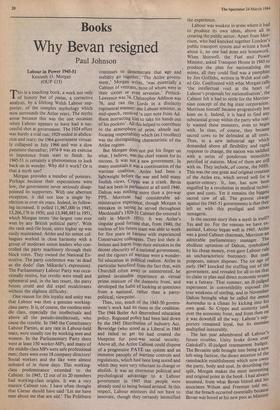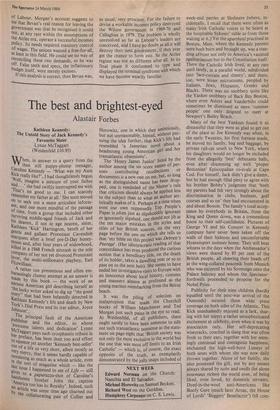Books
Why Bevan resigned
Paul Johnson
Labour in Power 1945-51 Kenneth 0. Morgan (OUP £15)
This is a touching book, a work not only of history but of pietas, a corrective analysis, by a lifelong Welsh Labour sup- porter, of the complex mythology which now surrounds the Attlee years. The myths arose because this was the one occasion when Labour appears to have had a suc- cessful shot at government. The 1924 effort was barely a trial run; 1929 ended in abdica- tion and tears; the 1964 government virtual- ly collapsed in July 1966 and was a slow puncture thereafter; 1974-9 was an exercise in impotence from start to finish. So 1945-51 is certainly a phenomenon to look back on in wonder. Why did it work? Or is that a myth too?
Morgan provides a number of pointers. Perhaps because their expectations were low, the government never seriously disap- pointed its supporters. With one aberrant exception, it did not lose a single by- election in over six years. Indeed, its follow- ing increased. It polled 11,967,000 in 1945, 13,266,176 in 1950, and 13,948,883 in 1951, which Morgan terms 'the largest vote ever won by any British political party'. With the rank-and-file loyal, unity higher up was easily maintained. Attlee and his senior col- leagues worked in close harmony with a group of moderate union leaders who con- trolled the party machinery through their block votes. They owned the National Ex- ecutive. The party conference was 'as dead as the dodo' (Ian Mikardo's expression). The Parliamentary Labour Party was occa- sionally restive, but revolts were small and ephemeral and, in the last resort, the party bosses could and did expel recalcitrants without the slightest difficulty.
One reason for this loyalty and unity was that Labour was then a genuine working- class party. It is, of course, the rootless mid- dle class, especially the intellectuals and above all the pseudo-intellectuals, who cause the trouble. In 1945 the Constituency Labour Parties, at any rate in Labour-held seats, were usually run by working men and women. In the Parliamentary Party there were at least 150 worker-MPs, and many of the middle-class MPs were safe professional men; there were even 18 company directors! Social workers and the like were almost unheard of in those days. This working- class predominance extended to the Cabinet. In 1945, 12 out of its 20 members had working-class origins. It was a very mature Cabinet too. I have often thought that Caesar should have said 'Let me have men about me that are old.' The Politburo continues to demonstrate that age and stability go together. `The Attlee govern- ment,' Morgan writes, `was essentially a Cabinet of veterans, most of whom were in their sixties or even seventies.' Pethick- Lawrence was 74. Christopher Addison was 76, and ran the Lords in a distinctly regimental manner: one Labour minister, in mid-speech,
received 'a curt note from Ad- dison instructing him to take his hands out of his pockets'. All this helped to contribute to the atmosphere of prim, almott suf- focating respectability which (as I recollect) was the distinguishing characteristic of the Attlee regime.
But Morgan does not put his finger on what, I believe, was the chief reason for its success. It was not a new government. In many essentials it was a continuation of the wartime coalition. Attlee had been a lightweight before the war and held many foolish views: Cripps was a crank. Bevin had not been in parliament at all until 1940. Dalton was nothing more than a pre-war PPS. Morrison had considerable ad- ministrative experience, though Morgan is mistaken in saying he served throughout Macdonald's 1929-31 Cabinet (he entered it only in March 1931). It was Attlee's singular good fortune that, from 1940, the nucleus of his future team was able to work for five years in harness with experienced Conservative colleagues. They lost their il- lusions and learnt from their mistakes in the decent obscurity of a national government, and the rigours of wartime were a wonder- ful education in political realism. Attlee in particular benefited from the fact that, with Churchill often away or uninterested, he gained invaluable experience as virtual prime minister of the domestic front, and developed the habit of looking at questions from a national, rather than a party- political, viewpoint.
Then, too, much of the 1945-50 govern- ment's work had its roots in the coalition. The 1944 Butler Act determined education policy. Regional policy had been laid down by the 1945 Distribution of Industry Act. Beveridge (who stood as a Liberal in 1945 and failed to get in) had created the blueprint for post-war 'social security. Above all, the Attlee Cabinet could dispose of a progressive PAYE tax system and an immense panoply of wartime controls and regulations, which had been long tested and which they were very reluctant to change or abolish. It was an enormous political and psychological advantage to a Labour government in 1945 that people were already used to being bossed around. In this respect, Labour ministers did not have to innovate, though they certainly intensified the experience.
Labour was weakest in areas where it had to produce its own ideas, above all in creating the public sector. Apart from Mor- rison, who had knocked together London's public transport system and written a book about it, no one had done any homework. When Shinwell, the Fuel and Power Minister, asked Transport House in 1945 to
, produce the plan for nationalising the mines, all they could find was a pamphlet by Jim Griffiths, written in Welsh and call- ed Glo. Confronted with what Morgan calls `the intellectual void at the heart of Labour's proposals for nationalisation', the Cabinet felt it had to settle for the Morriso- nian concept of the big state corporation. Morrison himself became progressively less keen on it. Indeed, it is hard to find any substantial group within the party who real- ly wanted these monsters, even to begin with. In time, of course, they became sacred cows to be defended at all costs. Thus, in a new industrial age which demanded above all flexibility and rapid response to change, the nation was saddled with a series of ponderous monoliths petrified id statutes. Most of them are still with us. They include, of course, the NHS. This was the one great and original creation of the Attlee era, which served well for a quarter-century. It, too, has now been engulfed by a revolution in medical techni- ques and costs. Yet it remains the biggest sacred cow of all. The gravest charge against the 1945-51 governments is that they left us with this prodigal and taboo menagerie. Is the success story then a myth in itself? Yes and no. For the reasons we have ex- amined, Labour began well in 1945. Attlee was a good Cabinet chairman, Morrison an admirable parliamentary manager. The ebullient optimism of Dalton, symbolised by his cheap money, even gave Labour rule an uncharacteristic buoyancy. But man proposes, nature disposes. The ice age of early 1947 knocked the stuffing out of the government, and revealed for all to see that its claim to plan and direct economic events was a fantasy. That summer, an ill-judged experiment in convertibility exposed the true weakness of sterling, and in November Dalton brought what he called the annus horrendus to a climax by kicking into his own goal. So Cripps and austerity took over the economic front, and from then on it was downhill all the way. Labour's sup- porters remained loyal, but its enemies multiplied inexorably. The last year adumbrated all Labour's future troubles. Unity broke down over Gaitskell's ill-judged rearmament budget. The Bevanite split brought into being a new left-wing faction, the direct ancestor of the ramshackle establishment which now owns the party, body and soul. In describing the split, Morgan makes the most interesting and original point in the book. I had always assumed, from what Bevan hinted atid his associates Wilson and Freeman told me, that the breach occurred essentially because Bevan was bored at his new post as Minister
of Labour. Morgan's account suggests to me that Bevan's real reason for leaving the government was that he recognised it could not, at any rate within the assumptions of the Attlee era, operate a successful incomes policy. Its needs required statutory control of wages. The unions wanted a free-for-all, at least in this field. He could see no way of reconciling these two demands, so he was off. False teeth and specs, the inflationary budget itself, were merely excuses. If this analysis is correct, then Bevan was, as usual, very prescient. For the failure to devise a workable incomes policy destroyed the Wilson government in 1969-70 and Callaghan in 1979. The problem is wholly unresolved so far as Labour's leaders are concerned, and I have no doubt at all it will destroy their next government, if they ever get the chance to form one. So the Attlee regime was not so different after all. In its final phase it conformed to type and displayed the terminal syndrome with which we have become wearily familiar.











































 Previous page
Previous page